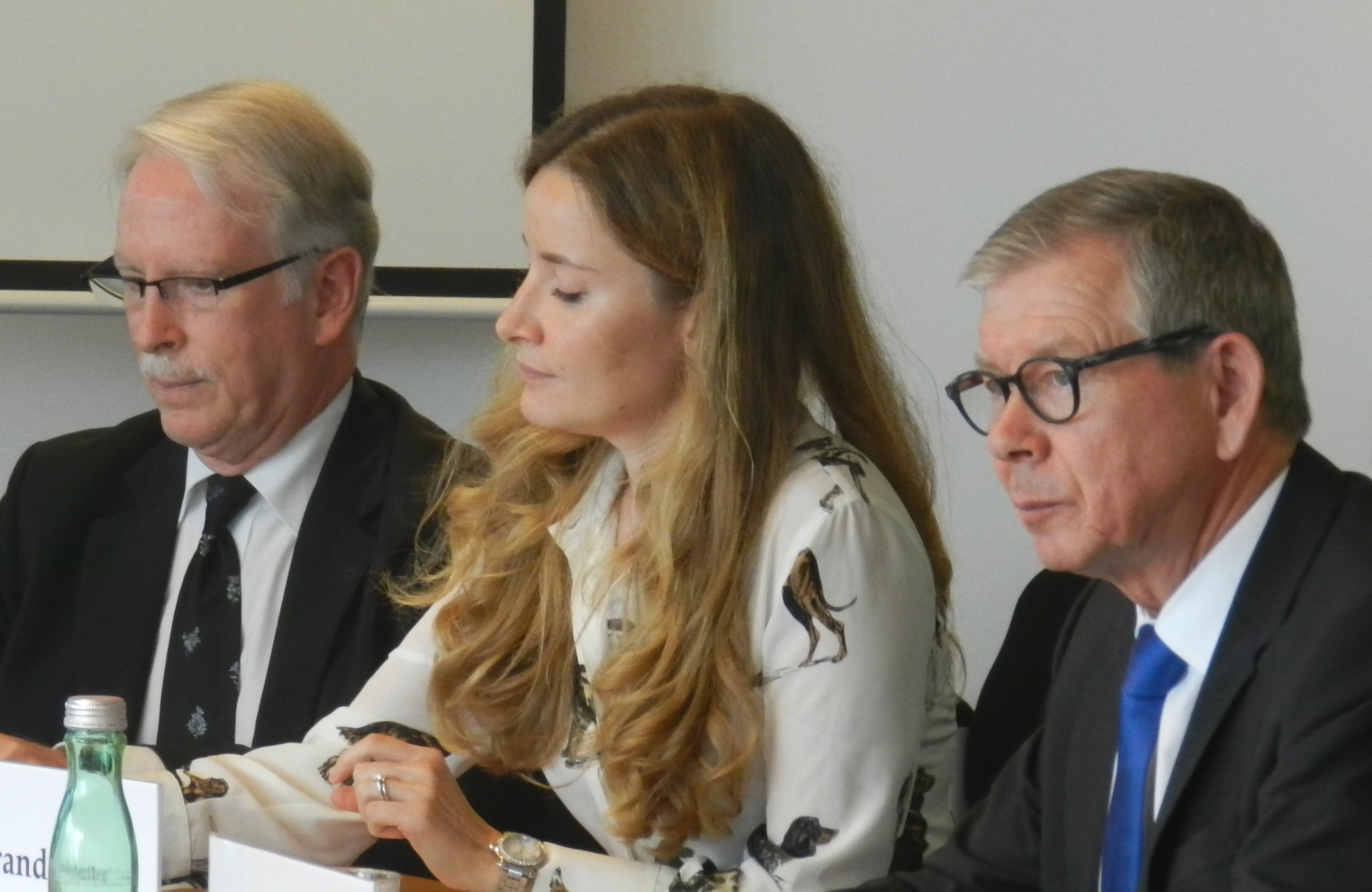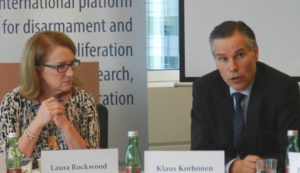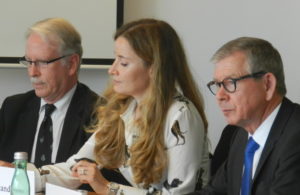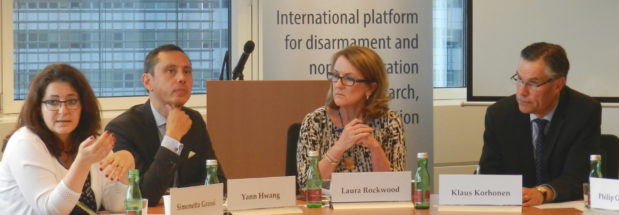
On 29 June 2017, the VCDNP, in collaboration with the Permanent Mission of the Republic of Finland to the International Organizations in Vienna, organized a high-level panel on "Contributions to Controlling Transfers of Conventional Arms." The discussion focused on ways to strengthen existing mechanisms that regulate the transfer of conventional arms. The event, which was moderated by VCDNP Executive Director Laura Rockwood, included a panel discussion with:

Every year conventional weapons are used to kill more than half a million people. Strengthening control of these weapons could help save lives and create conditions for economic and social development. With that in mind, the panelists discussed the efforts and contributions of various organisations and arrangements to control such transfers.
Brief opening remarks were delivered by the Finnish Ambassador to the International Organisations in Vienna, Mr. Hannu Kyröläinen, who described the ATT as “one of the bright spots in arms control in recent years.” The Ambassador expressed his Government’s intention to promote the universalization of the ATT, which aims to establish common standards for international trade by preventing the illicit trade and the diversion of conventional weapons. In trying to achieve these goals, the Ambassador highlighted that the ATT contributes to the global fight against terrorism, since all States Parties are required to conduct extensive risk assessments before exporting weapons.
 Ambassador Korhonen described the event as a gathering of “friends who have not yet met,” thus emphasizing the common goals shared by the participating organisations and the need for collaboration among the various entities. He argued that the ATT, by requiring implementation at a national level, gives States a certain flexibility, which is one of the reasons for its success. Ambassador Korhonen described the intricacies of arms trade, which has implications for a number of issues—related to security and defence, human rights and humanitarian law, trade and industry—the ramifications of which are so vast that only a few countries, if any, are not affected by it. He is optimistic for the future, given the successes already achieved by such a “young treaty,” which entered into force on 24 December 2014 and currently has 92 States Parties. He stressed, however, the dangers of conventional arms, defining them as “weapons of mass destruction in slow motion”—a view which was shared by the other panelists.
Ambassador Korhonen described the event as a gathering of “friends who have not yet met,” thus emphasizing the common goals shared by the participating organisations and the need for collaboration among the various entities. He argued that the ATT, by requiring implementation at a national level, gives States a certain flexibility, which is one of the reasons for its success. Ambassador Korhonen described the intricacies of arms trade, which has implications for a number of issues—related to security and defence, human rights and humanitarian law, trade and industry—the ramifications of which are so vast that only a few countries, if any, are not affected by it. He is optimistic for the future, given the successes already achieved by such a “young treaty,” which entered into force on 24 December 2014 and currently has 92 States Parties. He stressed, however, the dangers of conventional arms, defining them as “weapons of mass destruction in slow motion”—a view which was shared by the other panelists.
Ambassador Philip Griffiths highlighted the growing multilateral framework in this field and the expertise located in Vienna. States participating in the Wassenaar Arrangement (WA) committed to promoting transparency and responsibility in transfers of conventional arms in order to prevent destabilizing accumulations as well as their acquisition by terrorists. The WA is an intergovernmental information-sharing and standard-setting forum, characterized by a balance between consensus‑based agreement on key principles and national implementation. He saw the WA and the ATT as complementary and mutually reinforcing, while noting a number of differentiating elements, such as the WA’s inclusion of transfers of dual-use goods and technologies that could contribute to military capabilities, as well as in the scope and frequency of reporting. He believed that the WA’s annually updated Munitions List and its readily accessible export control guidance developed over 20 years could be a useful resource for other countries.
Mr. Yann Hwang presented the activities of the French government in preparation of its presidency of the Third Review Conference of the United Nations Programme of Action (PoA) to prevent, combat, and eradicate the illicit trade in SALWs. He stressed that, although the use of small arms leads to an enormous amount of victims, these weapons have been far too often neglected from political debates. Controlling a billion dollar arms trade is certainly a challenging task, especially since these weapons can easily be acquired and hidden. The French government aims to raise awareness on the urgency of the threat as a first step to intensify efforts to implement the provisions of the PoA, by focusing, for example, on the exchange of information related to stockpile management and security. Acknowledging that progress had been made in recent years, he encouraged the various entities (such as the ATT and the WA amongst others) to work together on practical synergies. Diplomatic discussions alone will not be enough to bring about change.
 Ms. Brandstetter spoke of arms trade as an issue that is “close to the OSCE’s heart,” given the organisation’s mandate to prevent conflict. She argued that the OSCE could play a role in promoting the implementation of the ATT, noting that a large number of OSCE participating States had already ratified the ATT, and the OSCE had a broad normative base regulating arms transfers. The OSCE has always provided a forum for discussion on all pertinent security issues, including potentially destabilizing arms transfers, and could continue to play a role, for example, by encouraging and promoting the use of best practices and assisting with reporting.
Ms. Brandstetter spoke of arms trade as an issue that is “close to the OSCE’s heart,” given the organisation’s mandate to prevent conflict. She argued that the OSCE could play a role in promoting the implementation of the ATT, noting that a large number of OSCE participating States had already ratified the ATT, and the OSCE had a broad normative base regulating arms transfers. The OSCE has always provided a forum for discussion on all pertinent security issues, including potentially destabilizing arms transfers, and could continue to play a role, for example, by encouraging and promoting the use of best practices and assisting with reporting.
Ms. Grassi referred to the efforts to counter illicit arms transfers from its criminal justice dimension. She shared her view that the licit and illicit arms markets influence each other, and that arms trafficking is oftentimes interlinked to other serious crimes, such as organized crime and terrorism. She stressed that the illicit trafficking of firearms represents a multidimensional and global threat to security that requires coordinated and sustained efforts from States, and she referred to inadequate legal frameworks and other challenges encountered by States in countering this crime. She underlined the complementary nature of existing international instruments, which, while different in scope, pursue common aims of promoting international cooperation to further global development goals. On that note, she highlighted the importance of establishing synergies among conventional arms control instruments and referred to the UNODC’s Global Firearms Programme, which assists States in the effective implementation of the Organized Crime Convention and its Firearms Protocol.

The panelists engaged with the audience in a stimulating discussion. A particularly interesting issue was raised with regards to criteria for deciding which side receives arms during a conflict. It was noted that, while there are no such clear criteria, States are reluctant to transfer weapons to non-State actors. Ultimately, however, the end decisions are made by countries on an individual basis. The Arms Transfers Database produced by the Stockholm International Peace Research Institute was mentioned as a valuable resource in navigating a complex landscape where information is often lacking. Once again, the importance of applying peer pressure as a mechanism for producing positive change was emphasized.
Ms. Rockwood thanked the participants and panelists for a substantive and constructive discussion, which represented a contribution by the VCDNP to promoting dialogue among different members of the “Vienna community.”
By continuing to use the site, you agree to the use of cookies. more information
The cookie settings on this website are set to "allow cookies" to give you the best browsing experience possible. If you continue to use this website without changing your cookie settings or you click "Accept" below then you are consenting to this.